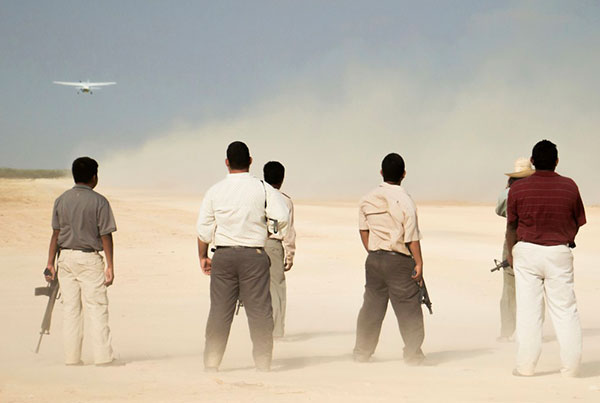Birds of passage
Anti-narcos
Film. We know narcos by heart.
But what was there before? Cristina Gallego and Ciro Guerra come back
to the origins of evil in Birds of passage,
Wayuu Indians’ crazy epic.
By Michael Patin
![]() Reading time 3 min.
Reading time 3 min.
In 2006, Cristina Gallego and Ciro Guerra settle in Colombia’s north coast so as to prepare their film The Wind Journeys (2009). There, they gather the testimonies of inhabitants at the time of « bonanza marimbera », that is the symbol of the beginnings of weed’s exportation to the US in the 70’s and 80’s. A blind spot in the country’s history, thought it resulted in the disappearance of almost all natives: the Wayuu. These traffic’s pioneers rise from the dead thanks to the directors and turn into (anti)heroes in The Birds of passage. And their camera asks an important question, which is like an obsession: what chain of events could have brought an entire nation to live under narcotrafic’ control? Hollywood (among others) is a pain in the neck because it enjoys exalting. It was necessary to ask the inhabitants to speak in order to reveal a truth fallen into pieces because of this fascination for Escobar and his henchmen. It was necessary to come back to the origins of Colombian evil.

Coming back to the origins
of Colombian evil
With that concern, it would have been easier to romanticize the « bonanza marimbera », to evoke a certainly pure and naive “before”, a lost innocence. But Guerra and Gallego avois this tentation with bravery, replacing it by an ethnologic and poetic look, something that was already a strength in Embrace of the Serpent (awarded in 2015 for the Directors’ Fortnight). All the rituals and symbols of the film of the ones of Wayuu tradition, but they’re seen through the filter of fatality. An epic story full of colourful characters. We think about Gabriel García Márquez’ long genealogies, with its fratricidal violences, its mystical omens and surrealistic visions… like this luxurious villa in the middle of nowhere, where the native family who became very rich waits for the ennemy.
Through Wayuu’s decline, the myth of the Noble savage explodes. The film reveals a clannish system in which everything was already marketable, food as well as women, words as well as life. A culture that welcomed capitalism as a distant cousin awaited for a long time to fall into terror and be destroyed. Hence the importance of the “palabrero” character, whose intermediary role is similar to the one of the “consigliere” in the mafia. Just like heads of families can recall some of the cinema’s godfathers- Scorsese’s shadow is never too far. Gallego and Guerra play with these codes, demarcated by Hollywood, and they find in this topic at the heart of culture good reasons to reappropriate them.
Wonderful anomaly, Birds of passage is both the prelude and antihtesis of all the films about narcos. A fresco in which violence is never kept away- and more or less joyful- but symbolizes the nagging curse of an entire country.
- Narcos
- Pablo Escobar
- Ciro Guerra
- Gallego
- Colombia
See also
